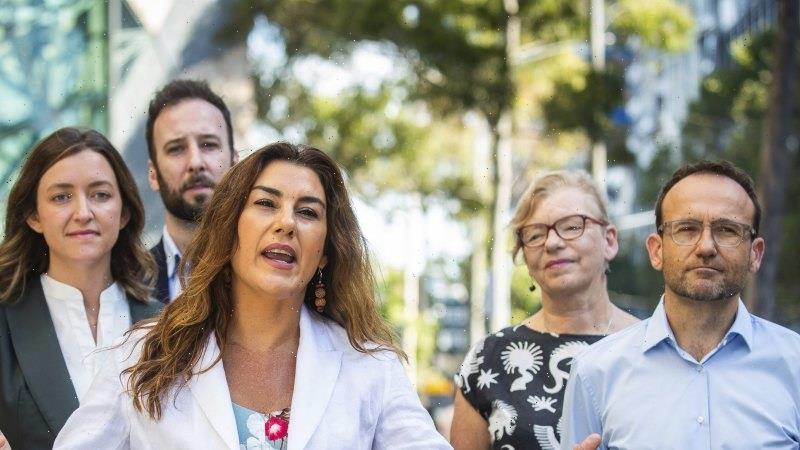Nicotine vape sellers are facilitating prescriptions for customers who never step foot in a doctor’s office or pharmacy, in what medical bodies say is a blind spot in regulations designed to restrict products to smokers trying to quit.
Customers are being prescribed vapes through web forms and telehealth services that are linked to vape businesses, or receiving referrals to online-only doctors from websites selling vapes promising quick scripts.
Australian Medical Association NSW president Dr Michael Bonning warned the practice created multiple conflicts of interest and that medical professionals prescribing vaping products through a web form were “taking a big risk with their registration”.
A marketing email sent to Smartpods’ customers.Credit:
Since October last year, Australians have needed a prescription to purchase nicotine vaping products, including e-liquids and pods, in an attempt to restrict their use to helping people quit smoking.
Bonning said there were ethical issues created by authorised prescribers linked to sellers.
“There are conflicts of interest in multiple streams here,” he said. “A doctor who is receiving referrals from a company that sells a product is an ethical issue for a doctor and a pharmacy receiving those scripts.”
“If these nicotine products are a prescription medication, they should be prescribed in the context of a patient’s healthcare and overall health; and that is not achieved through a web form or a five-minute phone call.”
A marketing email sent to previous Australian customers of US vape seller Smartpods this year informed them “how easy it is” to continue purchasing nicotine vapes through a new Australian prescriber business, Smartstop, which exclusively supplies Smartpods products.
The service offers a bulk-billed Telehealth phone consult or, for $45, will issue a prescription through an online form.
The email did not mention that vapes must be prescribed for smoking cessation. However, the Smartstop website states it “provides nicotine replacement therapy and education to quickly move [people] away from smoking”.
“Only one in three people who used e-cigarettes reported that they use them to help quit smoking, so most people are using them recreationally.”
Prescription Vape, an Australian pharmacy group, also offers prescriptions and vaping products.
A Prescription Vape spokesperson said it only issued scripts to people who had failed on other smoking cessation methods.
Both services declined to provide details of their medical staff but said they were authorised prescribers. Their doctors are not on the Therapeutic Goods Administration’s list of more than 700 authorised prescribers of nicotine vaping products, although inclusion on the list is not mandatory.
Major pharmacy chain Chemist Warehouse refers customers seeking to purchase vapes to the online service Instant Switch, whose prescribers are listed.
“We have grave concerns about patients receiving prescriptions this way,” said Dr Bruce Willett, vice-president of the Royal Australian College of GPs, urging people wanting to quit smoking to visit their GP.
The National Health and Medical Research Council released its latest report on e-cigarettes on Thursday, concluding “vapour from e-cigarette devices can be harmful and there is limited evidence that e-cigarettes are effective at helping smokers quit”.
Bonning said the association didn’t consider vaping to be a good cessation aid. The college of GPs considers vaping a “second or third” option for people trying to quit, Willett said.
Since January, NSW Health has seized more than $1 million worth of illegal e-cigarettes and liquids containing nicotine from convenience stores, service stations and other unauthorised sellers.
Arash Taji, pharmacist at Melbourne’s Amcal Pharmacy Prahran which fills Smartstop’s orders nationally, said the illegal market was still significantly larger than the number of prescriptions issued.
“I fill the scripts because we view it as a means of cigarette cessation,” he said.
Dr Samuel Murray, managing director of Quit Clinics, whose $85-a-consult service for current smokers is listed on vape selling websites although not affiliated with them, agreed the illegal market, particularly for teenagers, was a bigger problem. His average patient is in their early 40s.
He also saw issues with medical practitioners working for vape suppliers, but noted Australia was the only OECD country where nicotine vapes were regulated as medicines rather than consumer products and he believed his service was necessary because not enough GPs prescribed.
The National Health and Medical Research Council expressed particular concern about rising rates of vaping among younger people who had never smoked before.
“Only one in three people who used e-cigarettes reported that they use them to help quit smoking, so most people are using them recreationally,” federal Chief Health Officer Paul Kelly said.
The Morning Edition newsletter is our guide to the day’s most important and interesting stories, analysis and insights. Sign up here.
Most Viewed in National
From our partners
Source: Read Full Article



